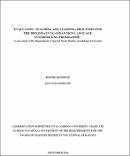| dc.description.abstract | This action research aimed at evaluating the teaching and learning processes for the Diploma in
Ugandan Sign Language Interpreting (UgSLI) programme at the Department of Special Needs
Studies (SNS), Kyambogo University. The problem; graduates from the programme upon
completion have insufficient skills in Sign language interpreting but do not possess language
competences required by the world of work. The study was based on three objectives that were
to examine the challenges that affect the teaching and learning processes for the Diploma in
UgSLI programme, generate implementable solutions to the challenges and evaluate the impact
of solutions implemented to improve the teaching and learning processes of the Diploma in
UgSLI programme. Participatory action research method was employed and thirty seven (37)
participants were involved in the study. They were all purposively selected as follows: six (6)
lecturers, eighteen (18) students, three (3) administrators, ten (10) graduates and their employers.
The Future workshop was used as a tool to identify challenges. Though many challenges were
identified, most of them needed more time and resources. Therefore, stakeholders decided that
this action research should focus on challenges which can be implemented without using much
time and resources. These were the communication gap between students and lecturers, negative
attitude, poor time management and limited time for course works. These were further examined,
possible solutions generated and an action work plan designed that was implemented from
October 2015 to October 2016.Action was taken and more practical lessons conducted, time
management template used, interaction of students with the Deaf community, timely feedback on
course works, compensation of lectures, motivating students towards the trade, confidence
building, utilising Deaf role models and career guidance to students. It was recommended by
stakeholders that evaluation of teaching and learning should be conducted every semester,
allocation of a lab for Sign Language practicals be considered for proper utilisation of time by
students, budgeting for Deaf role models/guest speakers, policy to curb time management, team
work and regular section meetings should be observed in order to improve the teaching and
learning processes for the Diploma in UgSLT programme. | en_US |

